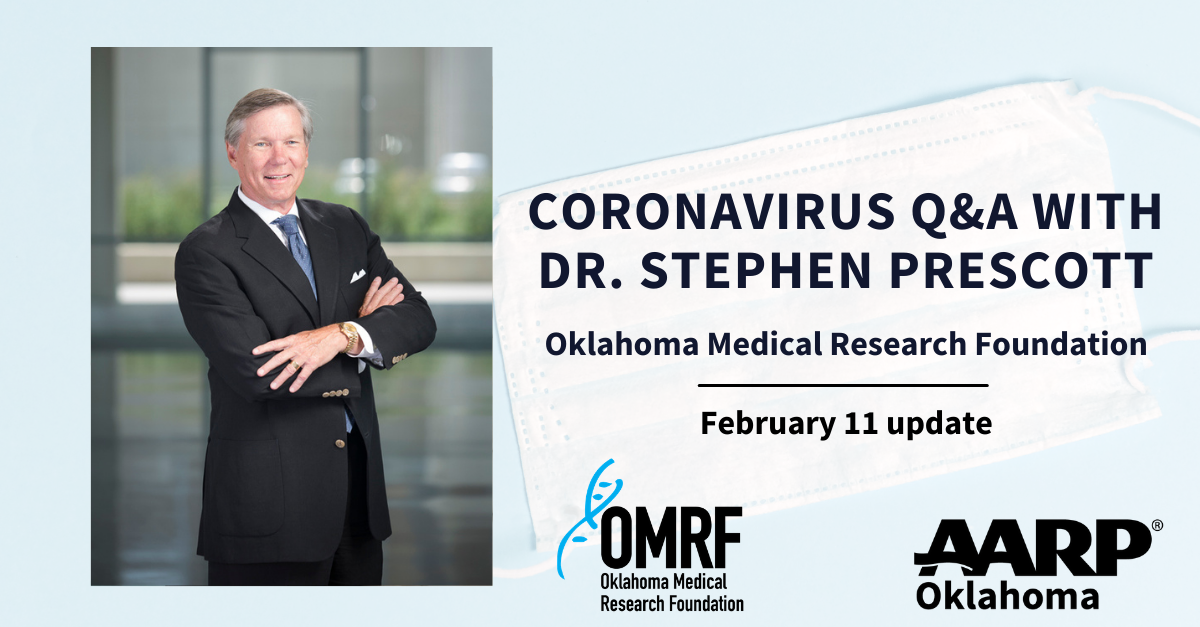AARP Hearing Center

Dr. Stephen Prescott, Oklahoma Medical Research Foundation president, answers your medical questions about coronavirus and COVID-19.
What’s is the difference in the new strains or variants of Covid-19?
“The biggest difference in the new strains from Brazil, South Africa and the U.K. is that each appears to be more contagious than the original strain from China. Variants, or mutations, in viruses are expected. Some viruses, such as measles, don’t change much at all. On the other hand, influenza mutates so rapidly we need a new vaccine for it every year. Covid-19 is somewhere in the middle.”
Will the new current and new vaccines protect against these variants?
“So far, the answer seems to be yes, although it appears some vaccines offer less protection against the new strains, especially the so-called South African strain. Early studies show the vaccines to be less likely to stop infection, but so far, there is no evidence the new variants are deadlier in vaccinated people. The mutations underscore the need to get the population vaccinated as quickly as possible; the more people we have vaccinated, the less chance for additional new strains to emerge.”
How long should I wait to get the vaccine if I have had COVID-19?
“If you have the chance to get a vaccine, you don’t need to delay. However, if you were treated with monoclonal antibodies or convalescent plasma during your bout of the virus, the CDC does advise waiting 90 days before being vaccinated. And it is worth reinforcing that yes, you should be vaccinated even if you have had Covid-19.”
Can I get the vaccine if I currently have an active case of COVID-19?
“If you currently have Covid-19, you should follow CDC guidelines and remain in isolation. But if it turns out you were infected and didn’t know it when you were vaccinated, it’s OK. When Pfizer and Moderna tested their new vaccines, some people were infected but asymptomatic when they received the vaccine. That group didn’t show any differences from healthy people in their response to the vaccine.”
Can you still get the virus and spread it to others even if you have had the vaccine?
“We don’t know. Scientists are now studying this question, but until we know, everyone should behave like the answer is yes and continue to wear masks and physically distance, even if you’re fully vaccinated.”
Are there any preexisting conditions or allergies that would prevent me from getting the vaccine?
“People who are allergic to polyethylene glycol or polysorbate should not get Pfizer or Moderna’s Covid-19 vaccine. Further, if you have a history of anaphylaxis, you should consult with your doctor prior to being vaccinated. Although reports of serious side effects to the vaccines have been extremely low, the most frequent seems to be anaphylaxis, occurring in only about 1 in 100,000 vaccine recipients.”
I have heard about the need to possibly double mask with the new variants, is that true?
“Yes. Masks serve as a filter, and the better your filter, the fewer viral particles it will let through. Viral load seems to play a crucial role in determining 1.) whether a given exposure leads to infection; and 2.) if you get infected, how sick you ultimately become. Dual masks (like a well-fitting cloth mask over a disposable surgical one) may also complement one another in sealing any gaps that might otherwise allow viral particles to flow unobstructed to your airways.”
Related articles:
Coronavirus Q&A with Dr. Stephen Prescott: November 30 Update
Coronavirus Q&A with Dr. Stephen Prescott: October 19 Update
Coronavirus Q&A with Dr. Stephen Prescott: September 24 Update
Coronavirus Q&A with Dr. Stephen Prescott: September 1 Update
Coronavirus Q&A with Dr. Stephen Prescott: August 24 Update
Coronavirus Q&A with Dr. Stephen Prescott: August 4 Update
Coronavirus Q&A with Dr. Stephen Prescott: July 24 Update
Coronavirus Q&A with Dr. Stephen Prescott: April 28 Update
Coronavirus Q&A with Dr. Stephen Prescott: April 9 Update
Coronavirus Q&A with Dr. Stephen Prescott: April 2 Update
Coronavirus Q&A with Dr. Stephen Prescott: March 26 Update
AARP and coronavirus
AARP has been working to promote the health and well-being of older Americans for more than 60 years. In the face of this pandemic, AARP is providing information and resources to help older people and those caring for them protect themselves from the virus and prevent it from spreading to others. AARP is compiling facts and resources about coronavirus and how you can protect yourself. We’re updating this information as rapidly as we can to ensure our AARP members have the information they need at www.aarp.org/coronavirus. Visit HERE for information about vaccination resources, health and food assistance in Oklahoma during the pandemic.































































